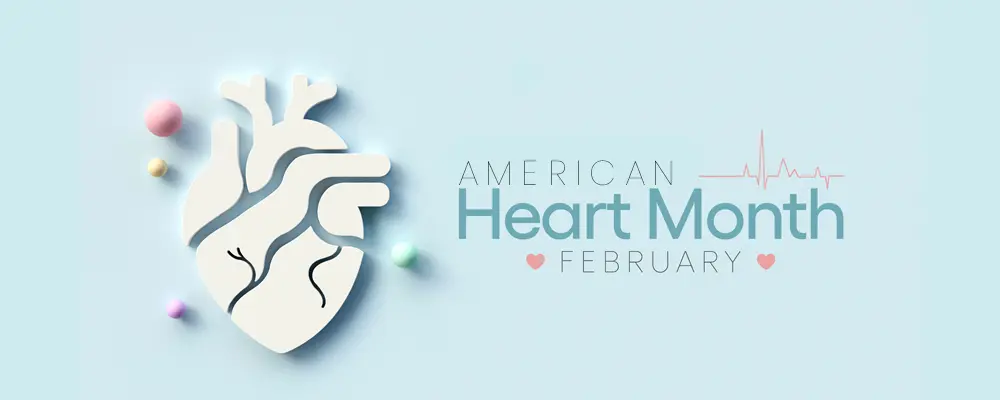The month of February exists as American Heart Month, a dedicated time to raise awareness about cardiovascular health and encourage individuals to take steps toward a heart-healthy lifestyle. The official observance seeks to combat against growing heart disease rates because it continues to act as the number one cause of death in US.
The promotion of heart health attracts millions of Americans who unite to advance heart-health through education and awareness campaigns in addition to lifestyle transformations. The American Heart Association ensures its significant contribution to these efforts by organizing events, providing resources, and launching nationwide campaigns.
Why American Heart Month Matters
Heart disease is a condition known to impact individuals from different age groups, ethnicities, and professional lifestyles. According to the Centers for Disease Control and Prevention (CDC), heart disease is the cause for one in every five deaths in the United States. Advancements in medical research and technological progress have not reduced the growing numbers of cardiovascular diseases so heart health awareness demands increased attention now more than ever.
Numerous healthcare organizations, healthcare professionals and communities collaborate come together every February to push people toward heart-healthy behaviors while encouraging early diagnosis and demonstrating the value of proactive medical attention. The prevention of heart disease becomes attainable when people start addressing the risk factors such as high blood pressure, high cholesterol, obesity, diabetes, and smoking.
Understanding Heart Disease and Its Impact
Heart disease is an umbrella term for various disorders of the cardiovascular system that include:
- Coronary Artery Disease (CAD): It is the most prevalent form of heart disease, resulting from the buildup of plaque in the arteries.
- Heart attacks: They occur when blood flow is blocked to the heart.
- Heart failure: It is a condition wherein the heart does not pump blood adequately.
- Arrhythmia: An irregular heart rhythm with potential complications.
- Stroke: Related to heart disease, strokes occur when there is an interruption in blood flow to the brain.
These conditions can develop due to genetic predispositions, but lifestyle choices play a significant role in increasing or reducing risks.
Also Read: Isolated Diastolic Hypertension and the Risk of Cardiovascular Disease: Understanding the Connection
American Heart Month: Key Steps to “Reclaim Your Rhythm” and Protect Your Heart
Adopting a heart-healthy lifestyle is essential for preventing and managing cardiovascular diseases. Here are some vital steps to help reclaim your rhythm and protect your heart:
1. Get Active and Exercise Regularly:
The American Heart Association (AMA) recommends at least 150 minutes of moderate-intensity exercise per week. Physical activity helps strengthen the heart, improve circulation, lower blood pressure, and maintain a healthy weight. Individuals should:
- Try activities like brisk walking, swimming, cycling, or dancing.
- Incorporate strength training exercises at least twice a week.
- Avoid prolonged sitting, they should stand up and stretch every hour.
2. Eat a Heart-Healthy Diet:
A well-balanced diet plays a crucial role in maintaining cardiovascular health. Individuals should focus on consuming:
- Fruits and vegetables: They are powerhouses of vitamins, minerals, and antioxidants.
- Whole grains: These helps regulate cholesterol levels and maintain digestive health.
- Lean proteins: Sources like fish, poultry, beans, and nuts are heart friendly.
- Healthy fats: They are found in avocados, olive oil, and nuts.
Low-sodium foods: Excess sodium can raise blood pressure, increasing heart disease risk.
3. Quit Smoking and Limit Alcohol Intake:
If an individual smokes, quitting can significantly reduce your risk within a year. Additionally, excessive alcohol consumption can lead to high blood pressure and weight gain, further increasing cardiovascular risks. Individuals should:
- Seek professional support or nicotine replacement therapies to quit smoking and alcohol.
4. Manage Stress and Mental Health:
Chronic stress and anxiety can contribute to heart disease. Individuals should practice relaxation techniques and prioritize mental well-being. They should:
- Try meditation, deep breathing, yoga, or mindfulness practices.
- Get sufficient sleep, aim for at least 7-9 hours per night.
5. Monitor Your Heart Health Regularly:
Regular health screenings can help detect issues early and prevent complications. Some essential heart health checks that individual should go for include:
- Blood pressure monitoring
- Cholesterol level tests
- Blood sugar screenings
- Body mass index (BMI) assessments
Routine visits to healthcare providers can help track progress and adjust lifestyle choices accordingly.
The Role of Community Involvement
Heart health is not just an individual responsibility, it requires community efforts. Healthcare organizations, workplaces, and local groups can host events, provide educational resources, and create supportive environments to help individuals lead heart-healthy lives.
Ways to participate:
- Organize heart health screenings in workplaces, schools, and community centers.
- Encourage walking meetings or group exercise sessions.
- Volunteer or donate to organizations like the AHA.
A Global Perspective on Heart Health
While American Heart Month is a U.S. initiative, heart disease is a global health crisis. The World Health Organization (WHO) reports that cardiovascular diseases account for over 17.9 million lives each year. Addressing this crisis requires international collaboration, research, and widespread education on heart-healthy living.
Conclusion: Take Action and Reclaim Your Rhythm
American Heart Month serves as a powerful reminder of the importance of cardiovascular health. By focusing on exercise, diet, stress management, and regular health screenings, individuals can significantly reduce their risk of heart disease and improve their overall quality of life.
By making small yet meaningful changes in daily life, individuals can protect their hearts and inspire others to do the same. Whether it’s by getting active, eating healthier, quitting smoking, or spreading awareness, every step counts.
Let’s use this month as an opportunity to commit to a heart-healthy lifestyle and encourage those around us to do the same. Remember, your heart beats for you, it is essential to take care of it!




